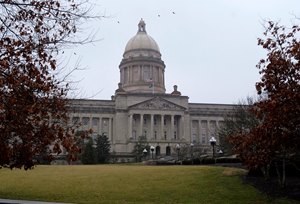Livestock Designation for Horses Vital for Kentucky


A Kentucky bill that would uniformly designate horses as livestock has been approved by both houses of the legislature and now awaits the signature of Gov. Matt Bevin.
Once the legislation (SB 139) becomes law, it would provide the groundwork for state lawmakers to move forward on related tax reforms that have the potential to save horse industry participants millions of dollars.
"For years our statutes have been unclear with the designation of horses, and as a result, one of our signature industries has suffered," said Speaker Pro Tem David Osborne of Oldham County. "This designation will clear the way for tax equity and other legal parity within the entire equine industry, which will strengthen the future for years to come."
Sen. Robin Webb, an accomplished horsewoman from Carter County, sponsored the bill, which she said provides badly needed consistency across all statutes.
"While the state has treated horses as livestock in most cases, whether it is humane laws, corporate protections, or some state and federal programs, this preserves their classification across all statutes as livestock as opposed to a companion animal," said Webb, noting some animal rights groups have tried to position the legislation as a backdoor to permit horse slaughter.
"That is not what this bill is about," she said. "There are other livestock animals that are not raised for food, like alpacas or llamas. Whatever else is being said is just rhetoric to sensationalize and raise money."
Osborne also stressed the bill in no way opens a door for horse slaughter nor weakens any horse protection laws. He said the same day SB 139 was approved unanimously, the legislature also passed HB 200, which would make it easier for local officials to intervene and remove horses in abuse and neglect cases.
HB 200 was filed in reaction to a 2016 Mercer County horse neglect case involving Thoroughbred trainer Maria Borell and her father, Charles Borell. They were both charged with 43 counts of second-degree animal cruelty after 43 horses were found abandoned on a farm they leased. This year's bill allows anyone convicted of animal cruelty to be required to pay restitution for damages to property and for the costs associated with sheltering, veterinary care, and rehabilitation of neglected horses, and allows for the termination of a person's right to own or care for horses, in addition to any imprisonment or fines imposed by a judge.
As to the benefits from the livestock designation for horses, a 6% sales tax now levied on feed, bedding, and equipment used for horses could be renegotiated as part of an upcoming broader tax reform initiative. Currently the sales taxes on horse feed and supplies generates about $18 million annually. All other livestock are exempt from sales tax on those same necessities.
Osborne, an owner of both Thoroughbreds and Saddlebreds, said tax equity is only part of the picture, noting the new law would afford new protections to horse farmers.
"You can't be included in an agricultural conservation district unless you are a livestock and agricultural enterprise," he said. "Well, horses were not included in that definition until now. It gives you certain advantages and legal standings as far as zoning, city annexation—things like that. ... Right now, it's a crime to cut somebody's fences if they have cattle or other livestock. But horses are not defined in that statute."
Securing the livestock classification has been among the top policy priorities of the Kentucky Equine Education Project since its 2004 creation.
"SB 139 is an important step forward for the Kentucky horse industry, and legislative success like this is a product of years of commitment and hard work," said KEEP chairman Corey Johnsen. "Many KEEP members have been instrumental in getting this legislation to this point, but we owe particular recognition to Frank Penn for being a tireless leader and advocate on this issue from the start."
"Having horses and equines included as livestock in Kentucky law has been a key policy priority for KEEP since its founding over 12 years ago," said Penn, a KEEP board member and chairman of the organization's Equine Sales Tax Equity Task Force. "I applaud the Kentucky legislature for their unanimous support of SB 139 and recognizing horses' rightful place along side other agriculture commodities in Kentucky."
